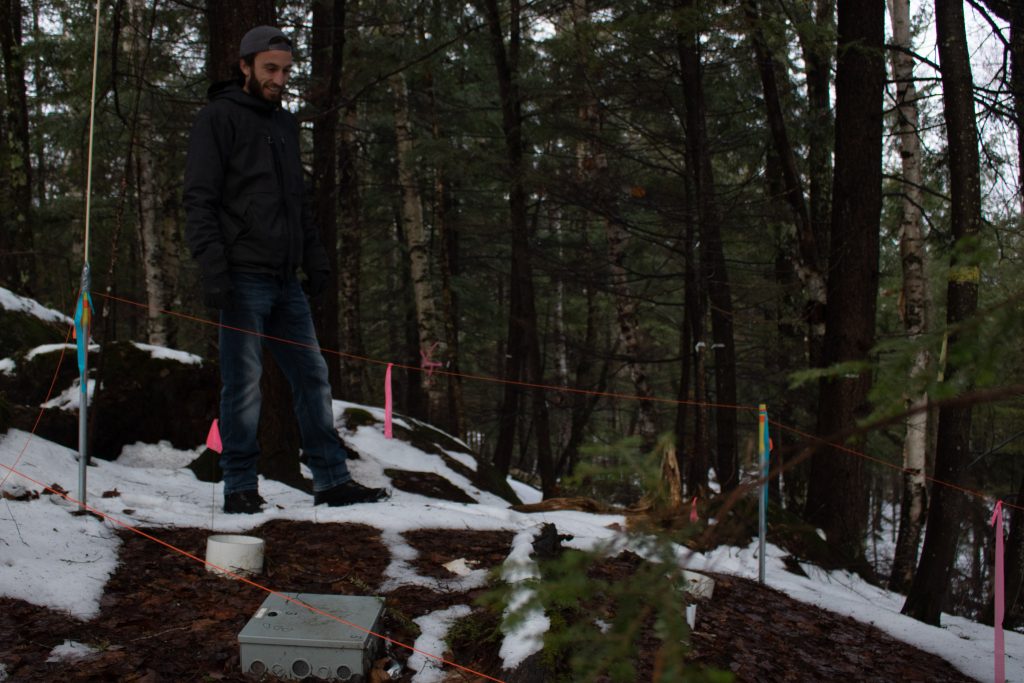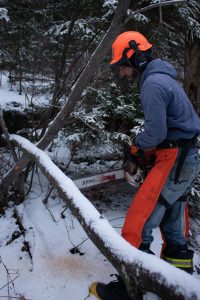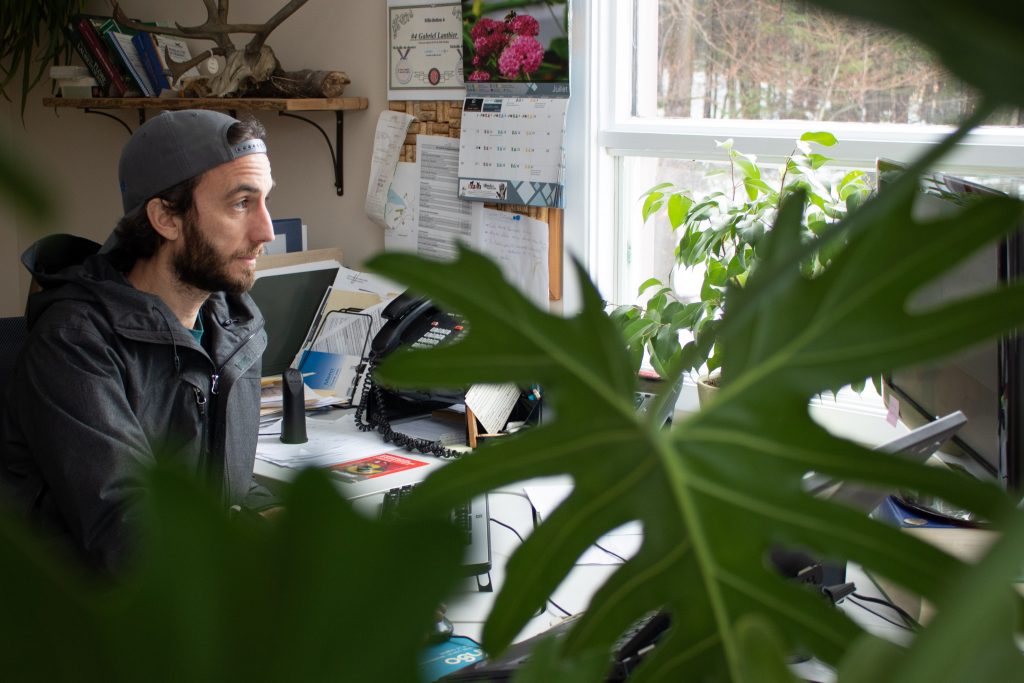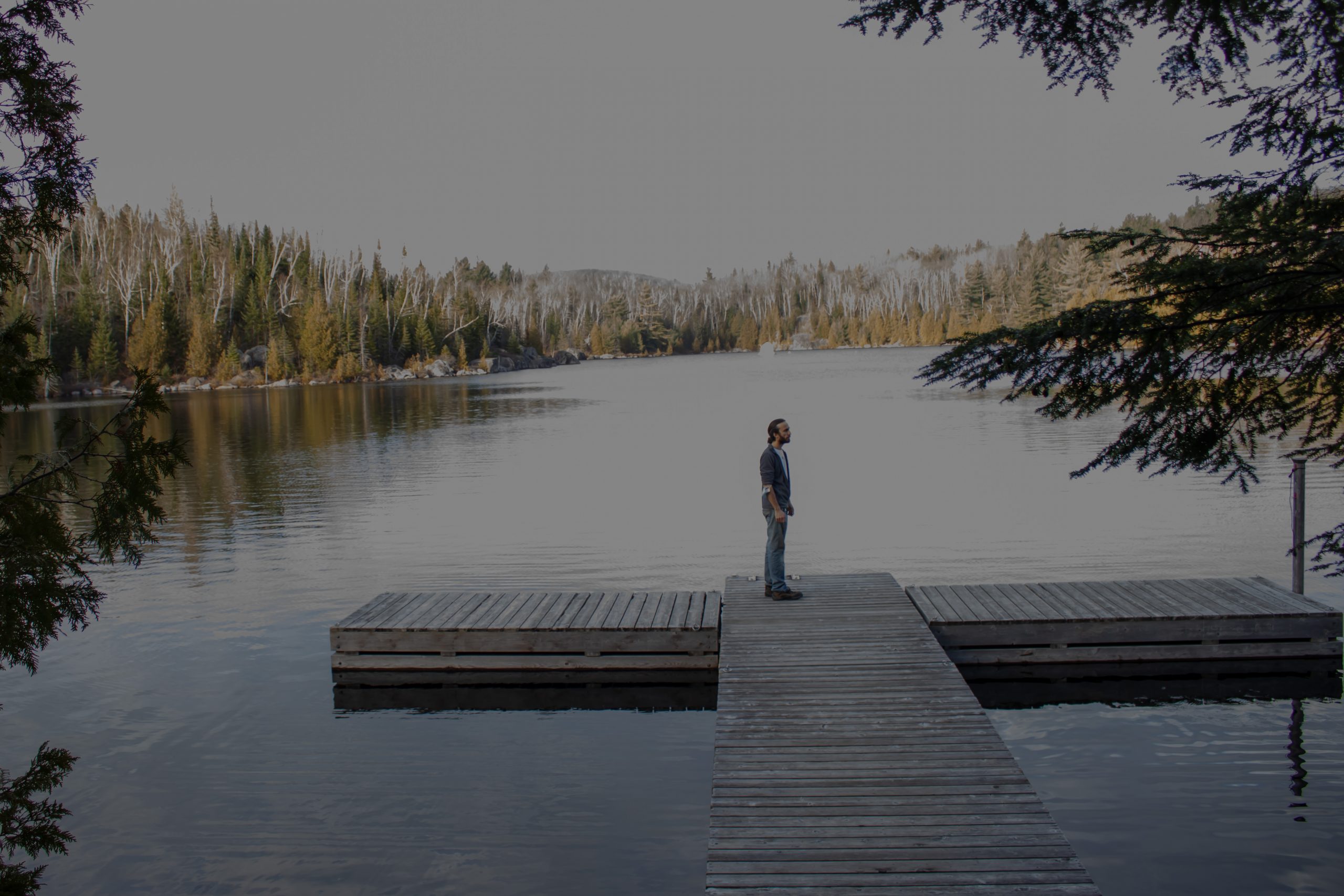While many Canadians suffer the toll of social isolation, one man spends six months working in near-total solitude every year, and loves it. Experts explain why.
“I’m able to see in my six months of ‘solitude’ something super positive. It takes time. The first weeks when I’m alone here, it’s strange,” says Gabriel Lanthier, in his fourth year as manager of the University of Montreal’s Laurentian Biology Station. In this role, he spends November until May working alone at the rural site, managing, repairing, and maintaining the 16.4 square kilometres of land.
In turn, during the summer season, it’s all hands on deck, as Lanthier manages a team of eight who run the site that houses many active research experiments and University of Montreal classes, hosts students who are writing theses, and rents the space out to private events.

Why does he love solitude?
“We underestimate in everyday life our need for space, for tranquility. We’re all on a rolling train.” He continues, “People often stop at the point where they’re about to break. The hard end.”
Lanthier was hired to work in an isolated region in the Lower Laurentians, 75 kilometres north of Montreal, where he lives with his partner and their two children. His lifestyle for the winter months — quiet, solitary, and slowed down — reflects the “new normal” introduced by social distancing laws enforced in Quebec, especially for remote workers, to curb the spread of COVID-19.

According to Statistics Canada, the percentage of Canadians experiencing poor mental health has tripled to 24 per cent since 2018, and young people are hit hardest over recent social distancing measures. Further, “Over half of participants report that their mental health has worsened since the onset of physical distancing,” according to the study.
Burnout culture is not a new phenomenon. In response to a rise in stress and burnout among Canadian labourers, Quebec has been working to expand its legislation protecting worker’s health to include mental health as well, according to Canada’s Occupational Health and Safety Magazine.
Recently, experts have warned of the psychological strain that essential workers face during this time, which can ultimately lead to greater risk as employees, facing exhaustion, are more susceptible to mistakes.
According to a Statistics Canada report, those with the most education are more likely to hold positions that can be done from home, illustrating that “The risk of experiencing a work interruption during the pandemic might fall disproportionately on financially vulnerable families.” Further, it poses the dilemma for those working in low-paid, high contact industries, such as the service industry or factory work, whether or not to absorb high risks by working in person.
So, is solitude really the culprit of this swelling unwellness, or is it merely a symptom of something else?
Lanthier attributes his wellness in the face of solitary winters to three things — he likes his job, he works outside, and he slows down.

Meaningful work is a central factor to job satisfaction. That and “mastering, leadership, balance, influence, achievements and colleagues,” according to the Happiness Research Insititue’s 2019 Job Satisfaction Index.
This research studies Danes’ work satisfaction, identifying three main issues that workers faced in 2019 — managing the “work-life balance,” “stress,” and fostering a “sense of identity from their job.” The research found that meaningful work offers labourers a stronger sense of job satisfaction, which in turn heightens their happiness.
“Me, I’m in paradise,” says Lanthier. “I’m sure it’s not the same situation if you ask me to work in a four-and-a-half, no windows, semi-basement, for eight hours in front of a computer. I would not have the same appreciation of isolation than what I have.”
According to the theory of logotherapy developed by psychiatrist and neurologist Viktor Frankl, humans derive happiness from meaning — through purposeful work, relationships, or suffering, as explained in his book, “Man’s Search for Meaning,” first published in 1946.
The connection between human happiness and meaningful work has a long history, with a body of research behind it. Sustainability is a welcome recent addition to the conversation by experts in happiness.
“I really think a sustainable economy needs to be built on meaningful work,” says economic historian Dr. Kent Klitgaard. “I don’t think you can have this kind of degraded job that everybody hates and you do it just to buy consumption goods that wear out quickly and don’t make you happy.”
The principle that we can be happier if we work less and slow down is on the rise amongst professionals working to scale back human consumption and invest more in well-being.
“We can have better lives, I’m convinced, with a lot less material and energy consumption,” says environmental economist Dr. Christian Kerschner.
The connections between slowing down, engaging in environmentally sustainable activities, consuming less, and happiness are detailed in a United Nations commissioned Sustainable Happiness report, conducted by The Happiness Research Institute.
According to the report, “The literature on voluntary simplicity provides abundant illustrations of persons who, by virtue of engaging in simpler lives, experience increased feelings of satisfaction and meaning. In other words: less stuff equals more happiness.”
“We have been very comfortable materially, but also if you look at our society’s emotional and psychological health,” says Kerschner, “we are not doing so well.”
What does meaningful work have to do with consumption? Since technology has replaced many — largely manual — jobs across industries, economies have found new uses for this labour force. These jobs tend to be mundane, dead-end, monotonous, with tight deadlines.
“I ask myself at what point is it healthy for the human mind? Something very routine — like a recipe — already established. Every day, 40 hours per week, for 20 years?” Lanthier asks. “Put it in an isolating mold, all alone, I would go crazy.”

The duality of Lanthier’s job — a busy summer followed by a quiet winter — taps into his need for a challenge, change, and allows him to grow his skills manually as well as interpersonally.
While routine is a very healthy practice to maintain both bodily and mental health, Lanthier has a point. A job where you do the same thing every day limits how much you can learn or be challenged. “For work to be meaningful, it needs to stimulate me, fill my life,” says Lanthier. “My work needs to help me grow, evolve, progress.”
“There’s studies that show people in the U.S. are working more hours on average than any generation before. So that leads

to the question,” Kerschner elaborates. “Is this really life? Is this really wellbeing?”
Some are finding their wellbeing comes from an active engagement with community and sustainability.
One collective-living community in Denmark began to examine the food waste in their home. With a separate trash can for food, the residents can see “direct proof of what food waste costs them each month and what they save by reducing such waste,” according to the Sustainable Happiness report. With less waste-based financial strain, workers need to earn less money and work less hours to afford a high quality of life.
Kerschner hopes that through this experience in social isolation, collectively, society can work to strengthen community ties, and register how important connection is for our health and happiness. When we liberate our time by working a little less, we create more time for the things that matter to us, connecting with our communities, and helping each other.
There is an understanding in mainstream social consciousness that sustainability is incompatible with abundance. On the contrary, cultivating abundance does not need to be expensive.
The Sustainable Happiness report stresses, “To completely unleash happiness potential, it is important to dispense with myths and misconceptions such as the false choice between sustainability and happiness.”
Through community initiatives, sharing, and connecting, abundance can be very cost-efficient, sustainable, and joyous.
Photos by Simona Rosenfield, taken on December 2, 2020




